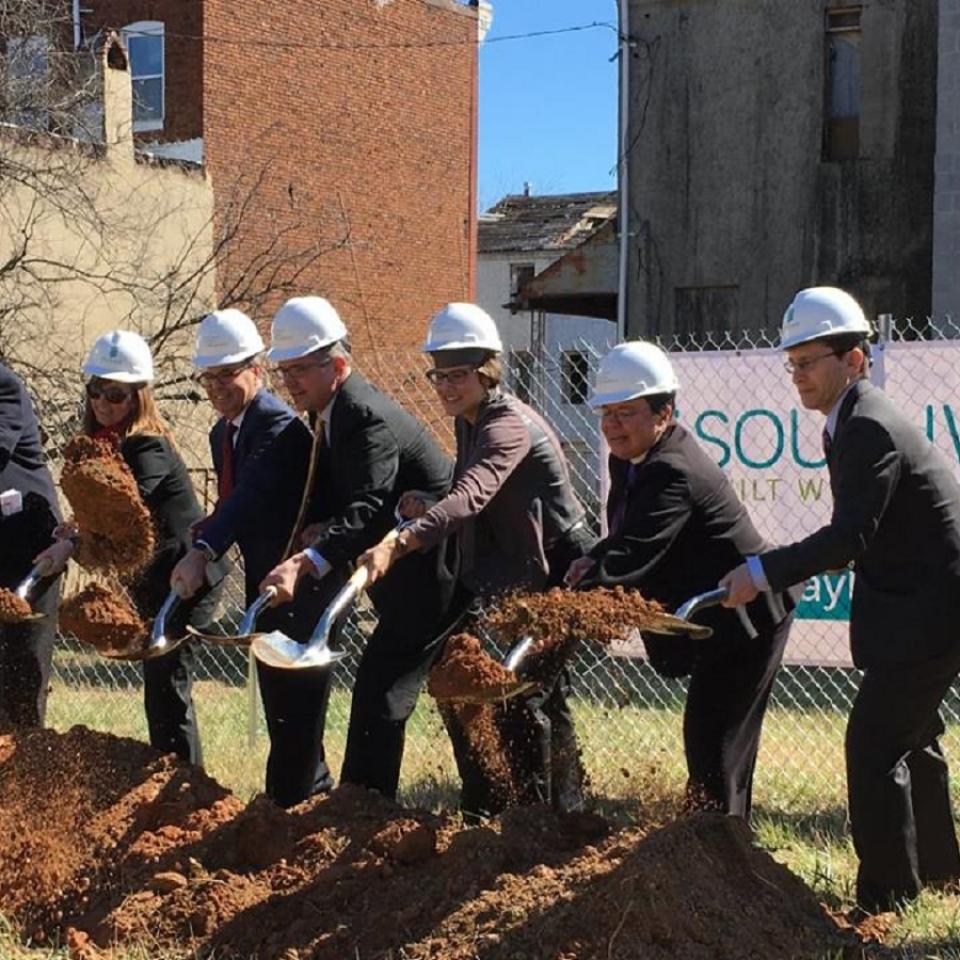Have you ever felt like throwing up your hands in frustration? Sometimes it can feel like “nothing” is working or “everything” is against you. Each of us has strengths. Even if the odds are truly against us, there are actions we can take.


03.14.17
Dan McCarthy couldn’t have put it better when he said, “this isn’t ground breaking – it’s ground making.”
On March 8, 2017, neighbors, government officials and local advocates joined McCarthy, the executive director of Episcopal Housing Corporation, in a vacant lot near the corner of Lafayette and Argyle avenues in West Baltimore’s Upton neighborhood to celebrate the realization of a project that has been two years in the planning. With hard hats and shovels in hand, they broke ground on Sojourner Place at Argyle Avenue and ushered in a new kind of supportive housing for Baltimore: apartments with built-in supportive services for individuals who have experienced chronic homelessness.
A partnership between Episcopal Housing Corporation, Towner Management Co. and Health Care for the Homeless, the project takes the widely accepted “housing first” approach, where housing is offered to people experiencing homelessness without preconditions and where rapid placement and stabilization in permanent housing are the key goals. The Sojourner partners hope the project will be a model for future similar projects in Baltimore City and beyond.
“We look forward to expanding opportunities for our homeless population,” said Mayor Catherine Pugh, who gave remarks at the ground breaking and called for a stepped-up commitment to our neighbors without homes. “This is a step in the right direction, and I’m grateful to support this project.”
In 2015, Episcopal Housing Corporation and Health Care for the Homeless forged a partnership to create a 12-unit permanent supportive housing development for individuals experiencing chronic homelessness. As the project owner, Episcopal Housing purchased six adjacent parcels in the 1200 block of Argyle Avenue from the city through its Vacants to Value program, secured the support of the Upton Planning Committee, a neighborhood citizens group, and secured financing for the project. Towner Management will serve as property manager for the project and Health Care for the Homeless will provide tenants with ongoing care and case management services spanning medical, behavioral health and dental care; income and benefits support; vocational and employment assistance; substance use treatment and linkages to additional services as needed and available.
Thanks to the leadership of Episcopal Housing, the collaborative spirit and support of the Upton Planning Committee and widespread commitment among state, city and community leaders, 12 individuals or couples will have a new place to call home before the year is out.
“We hope the work here can create the necessary momentum to attract the philanthropic community and the state and the city to build the projects required to bring folks off the street,” said Kenneth Holt, Secretary of the Department of Housing and Community Development. “Permanent supportive housing is one component of a necessary strategy.”
The Sojourner project marks in a concrete and emphatic way the shift away from long-held housing readiness policies in this country to the now widely accepted housing first model.
"We know that homelessness is not permanent,” Health Care for the Homeless President and CEO Kevin Lindamood told the folks gathered in the Argyle lot, before donning a hard hat and grabbing a shovel. “We know that housing is the solution to homelessness. And we know that housing is, in fact, a form of health care.”
More Recent News
Send one email today to advocate for housing that serves all Marylanders. Let Governor Moore know that more permanent supportive housing is a good thing—and urge him to stay the course.
At our annual staff holiday party, we take time to honor and celebrate staff members who best represent our Core Values and one HCH-er at Heart.
Larrice is a mother, grandmother, teacher, cook and storyteller who was recently featured in our original documentary, “Taking Care: Portraits from Baltimore.”


